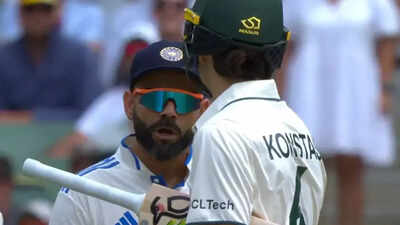
Why Virat Kohli Was Not Banned After Shoulder-Bumping Sam Konstas at MCG
Virat Kohli's on-field altercation with Australian debutant Sam Konstas during the fourth Test match at the MCG (Melbourne Cricket Ground) has sparked widespread discussion. The incident, which occurred on the first day of the Boxing Day Test, saw Kohli shoulder-bump Konstas, creating tension between the two players. Despite the physical nature of the exchange, Kohli managed to avoid a ban, though he did receive a fine and a demerit point. The question on everyone's mind is why Kohli wasn’t banned, considering the gravity of the confrontation.
The altercation took place at the end of the 10th over when Kohli, seemingly in a rush to get to his fielding position, collided with the 19-year-old Konstas. The bump was not overly aggressive, but it quickly led to a verbal exchange between the two, with the atmosphere escalating. Australian opener Usman Khawaja and umpire Michael Gough stepped in to mediate and calm the situation. Konstas himself later downplayed the incident, calling it a mere accident and attributing the heated moment to the intensity of the match.
Also Read:- Newcastle United Dominates Aston Villa with Impressive 2-0 Victory
- Spengler Cup 2024: What You Need to Know About the Tournament
In the aftermath, the International Cricket Council (ICC) handed Kohli a 20% fine of his match fee and awarded him one demerit point for violating the ICC Code of Conduct, specifically for inappropriate physical contact. However, no formal hearing was needed as Kohli accepted the sanctions proposed by match referee Andy Pycroft. This decision has led to mixed reactions, with many questioning whether the punishment was too lenient given Kohli’s stature in world cricket.
To understand why Kohli wasn’t banned, it’s important to look at the ICC’s guidelines. The breach was classified under Article 2.12 of the ICC Code of Conduct, which deals with inappropriate physical contact. Such breaches are categorized into four levels, and the severity of the breach is determined by factors like intent, force, and context. In this case, Kohli's actions were deemed to be a Level 1 or Level 2 offense, as there was no clear indication of deliberate aggression or intent to harm Konstas. If Kohli had physically interacted with an umpire or match referee, it would have been considered a Level 3 or Level 4 offense, which would have warranted stricter penalties, including suspension.
Kohli’s fine and demerit point are considered relatively mild consequences. Moreover, this is the first demerit point Kohli has received since 2019, meaning he hasn’t accumulated enough points for a ban. Former cricketers like Ricky Ponting and Ravi Shastri expressed their views, with some suggesting Kohli's actions could have warranted stronger sanctions to maintain discipline in the game. However, the consensus remains that Kohli's clash with Konstas did not meet the threshold for a suspension, especially since the contact wasn’t overtly aggressive.
Kohli’s actions on the field may have caused a stir, but in the end, the ICC’s decision reflects their assessment that the incident, though heated, did not cross the line into serious misconduct. With just a fine and a demerit point, Kohli will be available for India’s next Test in Sydney, leaving the cricketing world to debate the consistency of disciplinary actions in high-profile cases like this one.
Read More:



0 Comments